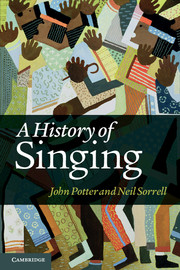Book contents
- Frontmatter
- Contents
- Acknowledgements
- Introduction
- Part I Imagined voices
- Part II Historical voices
- Chapter 3 The emerging soloist and the primacy of text
- Chapter 4 The age of the virtuoso
- Chapter 5 The nineteenth-century revolution
- Part III Recorded voices
- Chapter 7 Classical singing in the twentieth century: recording and retrenchment
- Chapter 8 Post-classical: beyond the mainstream
- Chapter 9 The emancipation of the popular voice
- Chapter 10 Sung and unsung: singers and songs of the non-English-speaking world
- Sources and references
- Bibliography
- Index
Chapter 8 - Post-classical: beyond the mainstream
Published online by Cambridge University Press: 05 June 2012
- Frontmatter
- Contents
- Acknowledgements
- Introduction
- Part I Imagined voices
- Part II Historical voices
- Chapter 3 The emerging soloist and the primacy of text
- Chapter 4 The age of the virtuoso
- Chapter 5 The nineteenth-century revolution
- Part III Recorded voices
- Chapter 7 Classical singing in the twentieth century: recording and retrenchment
- Chapter 8 Post-classical: beyond the mainstream
- Chapter 9 The emancipation of the popular voice
- Chapter 10 Sung and unsung: singers and songs of the non-English-speaking world
- Sources and references
- Bibliography
- Index
Summary
This chapter looks at varieties of singing that have been of considerable significance in terms of performances, recordings and critical acclaim, but remained apart from the mainstream of classical vocal culture. Early music and the extended vocal techniques of the avant-garde are essentially post-World War ii phenomena, and are seen to be ‘classical’ yet distinctly other; Jewish singing has a much longer historical pedigree but has also changed radically in the second half of the twentieth century and remains a mystery to many lovers of classical singing. We also consider the fragmentation of taste and style, and the weakening sense of genre that is characteristic of the early twenty-first century, and the growing tendency for classically trained singers to collaborate as ensembles, rather than compete as soloists.
It may seem odd to start a post-classical chapter with some thoughts on Jewish singing, which has a far longer history than Western classical or popular music and has at several points interacted with both. But for many non-Jews the rich and troubled heritage of Jewish music is hardly known at all, and yet it has produced some of the most spectacular singing of the twentieth century. Much of the singing described in previous chapters is secular; the performance of Renaissance sacred music is secularised by the modern concert hall, and even composers such as Arvo Pärt, for whom music is primarily a means of spiritual expression, write for the concert platform rather than for the liturgy. But the classical singing of Europe (and subsequently much of the Americas and the wider English-speaking world) can be described as having Christian roots. The secular variety developed initially within the church and then became professionalised via the court, opera house, concert hall and beyond; secular and non-secular singing therefore share many of the same characteristics at any given point in history. In modern multicultural Western countries there are many other varieties of singing to be found, and where these exhibit what might be thought of as classical characteristics they are also often influenced by religious custom.
- Type
- Chapter
- Information
- A History of Singing , pp. 216 - 239Publisher: Cambridge University PressPrint publication year: 2012



